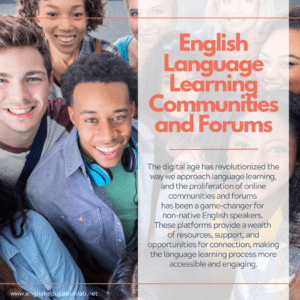
English as a second language: A beginner’s guide to language fluency
Are you a non-native English speaker looking to improve your language fluency? Look no further! This beginner’s guide is here to help you on your journey to becoming a confident English speaker. With English as the global language of business, travel, and communication, mastering it opens up a world of opportunities.

In this comprehensive guide, we will walk you through the essentials of learning English as a second language. From building a strong foundation in grammar and vocabulary to developing fluent speaking, reading, and writing skills, we’ve got you covered!
Whether you’re a complete beginner or already have some knowledge of English, this post will provide you with practical tips, strategies, and resources to accelerate your learning. We will also address common challenges faced by non-native speakers and suggest effective ways to overcome them. Let’s embark on this exciting language-learning journey together!
Importance of learning English as a second language
In today’s globalized world, the ability to communicate effectively in English has become increasingly crucial. As the predominant language of international business, diplomacy, and academia, proficiency in English opens up a world of opportunities for non-native speakers.
From securing lucrative job opportunities to navigating international travel and networking, mastering English can significantly enhance one’s personal and professional prospects. Employers around the globe often prioritize candidates with strong English language skills, as they are better equipped to collaborate with multinational teams, participate in global conferences, and engage with international clients.
Moreover, fluency in English can unlock access to a vast array of educational and research resources. Many of the world’s leading universities and academic institutions offer programs and publications in English, allowing non-native speakers to pursue higher education and contribute to cutting-edge research on a global scale. This linguistic advantage can be particularly beneficial for those seeking to further their academic or scientific careers.
Beyond the professional realm, proficiency in English also enriches personal experiences. The ability to communicate in the global lingua franca enables individuals to forge meaningful connections with people from diverse cultural backgrounds, fostering cross-cultural understanding and broadening one’s perspectives. Whether it’s traveling to new destinations, networking with international colleagues, or engaging in online communities, English language skills can greatly enhance the quality of one’s life experiences.
Language learning challenges that beginners face
Learning a new language, especially as an adult, can be a daunting and challenging endeavor. Beginners often face a range of obstacles that can hinder their progress and discourage them from continuing their language-learning journey. If this sounds like you, don’t worry! You are not alone!
One of the primary challenges is the sheer volume of vocabulary and grammatical structures that must be mastered to achieve fluency. The English language is renowned for its complexity, with a vast array of words, idioms, and nuanced rules that can be overwhelming for non-native speakers. Keeping track of new vocabulary, memorizing verb conjugations, and understanding the intricacies of sentence structure can be a significant hurdle for many beginners.
Pronunciation and accent also pose a significant challenge for non-native English speakers. The unique sounds and rhythms of the English language can be vastly different from one’s native tongue, making it difficult to achieve natural speech. Learners may struggle with distinguishing between similar-sounding words, properly articulating consonant blends, or maintaining the appropriate stress and intonation patterns.
Additionally, the lack of immersion in an English-speaking environment can hinder the development of fluency. Beginners who do not have regular opportunities to practice their English skills in real-world conversations may find it challenging to transition from textbook learning to practical application. This can lead to a lack of confidence and difficulty in understanding and responding to native speakers in natural, spontaneous exchanges.
Finding support as a beginner
Embarking on the journey of learning English as a second language can be a daunting task, but with the right support and resources, beginners can overcome the challenges they may face and achieve their language-learning goals. This doesn’t need to be a lonely journey, however!

One of the most valuable sources of support for non-native English speakers is language schools and classes. These institutions offer structured, comprehensive programs that cater to learners of all levels, from complete beginners to advanced speakers. Experienced instructors guide students through the fundamentals of grammar, vocabulary, and communication, providing a solid foundation for language acquisition.
In addition to formal language classes, beginners can also benefit from joining online language learning communities and forums. These platforms connect learners from around the world, allowing them to share their experiences, ask questions, and receive feedback from fellow non-native speakers and language experts. Engaging in these supportive networks can help reduce feelings of isolation and provide valuable insights into effective learning strategies.
Another crucial source of support for beginners is the guidance and encouragement of family, friends, and colleagues who are proficient in English. These individuals can serve as language partners, providing opportunities for conversation practice, correcting mistakes, and offering constructive feedback. Surrounding oneself with a supportive network of English speakers can significantly boost confidence and accelerate the learning process.
Effective language learning strategies
Mastering a new language as a beginner requires the implementation of a well-rounded and strategic approach. By incorporating a variety of effective learning techniques, non-native English speakers can maximize their progress and develop a strong foundation in the language.
One of the most fundamental strategies is to immerse oneself in the English language as much as possible. This can be achieved by consuming English-language media, such as podcasts, movies, TV shows, and news articles. Exposing oneself to authentic, conversational English can help train the ear, improve listening comprehension, and familiarize learners with common vocabulary and idiomatic expressions.
Another highly effective strategy is to practice speaking the language regularly. Whether it’s through language exchange programs, online tutoring sessions, or conversations with English-speaking friends and colleagues, regular practice is crucial for developing fluency and confidence. Learners should embrace every opportunity to engage in dialogue, even if it means making mistakes along the way.
In addition to immersion and speaking practice, effective language learning strategies also involve active engagement with written materials. Beginners should make a habit of reading a variety of texts, from children’s books and news articles to classic literature and academic papers. This exposure to diverse written content can enhance vocabulary, improve reading comprehension, and strengthen one’s understanding of grammar and sentence structure.
Staying motivated as a beginner
Learning a new language, especially as a beginner, can be a challenging and arduous process that requires dedication and perseverance. Maintaining motivation throughout the journey is crucial for achieving long-term success and fluency in English and comes with its own set of unique challenges!
One effective way to stay motivated is to set achievable, incremental goals. What do we mean by this? Rather than aiming for fluency overnight, beginners should break down their language learning journey into smaller, manageable milestones. This could involve mastering a specific grammar concept, expanding one’s vocabulary by a certain number of words, or improving reading comprehension by a certain percentage. Celebrating these small victories can provide a sense of progress and keep learners inspired to continue their efforts.
Another strategy for maintaining motivation is to find ways to incorporate English into one’s daily life. This could involve switching the language settings on digital devices, reading English-language books or newspapers, or listening to English-language podcasts during commutes or household chores. By seamlessly integrating the language into everyday activities, learners can develop a natural, habit-forming relationship with English, making the learning process more organic and enjoyable.
Additionally, beginners can benefit from seeking out language-learning communities, both online and offline, where they can connect with fellow non-native speakers and share their experiences. Engaging in these supportive networks can provide a sense of camaraderie, inspiration, and accountability, helping learners stay motivated and committed to their language learning journey.
English language learning communities and forums
The digital age has revolutionized the way we approach language learning, and the proliferation of online communities and forums has been a game-changer for non-native English speakers. These platforms provide a wealth of resources, support, and opportunities for connection, making the language learning process more accessible and engaging.

One of the most popular and active online communities for English language learners is Reddit’s r/EnglishLearning subreddit. This vibrant forum is a hub for learners from around the world to ask questions, share resources, and engage in discussions about various aspects of the English language. From grammar and vocabulary to pronunciation and idioms, the community offers a wealth of knowledge and support from both fellow learners and native English speakers.
Another invaluable resource is the online language learning platform Duolingo, which not only offers interactive lessons and exercises but also fosters a thriving community of users. The Duolingo forums provide a space for learners to connect, share their progress, and seek advice from more experienced speakers. The sense of camaraderie and accountability within the Duolingo community can be a powerful motivator for beginners on their language learning journey.
For those seeking more structured and guided support, platforms like Verbling and iTalki offer online courses and programs specifically designed for non-native English speakers. These platforms often include discussion forums where learners can interact with instructors and fellow participants, fostering a collaborative learning environment and the opportunity to receive personalized feedback. If you’re in search for a more hands-on approaching, working with a private teacher may be another option for you!
Taking your first steps as a beginner
Embarking on the journey to learn English as a second language can feel overwhelming, but with the right approach and mindset, beginners can make steady and meaningful progress. Here are some actionable steps to kickstart your language-learning adventure:
Set clear, achievable goals: Before diving into learning, define what fluency means to you. Are you aiming to communicate effectively in daily conversations, excel in academic settings, or enhance your professional opportunities? Setting specific, measurable goals will provide direction and motivation.
Choose the right resources: With a plethora of learning materials available, it’s essential to select resources that align with your learning style. Whether it’s interactive apps like Duolingo, comprehensive courses on Coursera, or one-on-one sessions through platforms like Verbling, pick tools that keep you engaged and challenged.
Establish a consistent routine: Consistency is key in language acquisition. Dedicate a specific time each day or week to focus on different aspects of the language—be it vocabulary building, grammar exercises, or listening comprehension. Even short, daily sessions can lead to significant improvements over time.
Engage in active practice: Passive learning has its limits. Actively practice speaking, writing, listening, and reading. Join language exchange communities, participate in forums, or find a study buddy. Real-world application reinforces learning and builds confidence.
Embrace mistakes: It’s natural to make errors when learning a new language. Instead of feeling discouraged, view mistakes as valuable learning opportunities. They highlight areas for improvement and guide your learning trajectory.
Immerse yourself in the language: Surround yourself with English as much as possible. Watch movies, listen to music, read books, or even change your device’s language settings to English. Immersion accelerates familiarity and comfort with the language.
Seek feedback and adjust: Regularly assess your progress and seek feedback from peers, tutors, or native speakers. Constructive criticism helps refine your skills and keeps you on the path to fluency.
Final thoughts
Embarking on the journey to learn English as a second language is a commendable endeavor that promises a multitude of rewards. From unlocking global opportunities to fostering deeper cultural connections, the benefits of mastering English are vast and transformative. While the path to fluency may present challenges, with determination, the right resources, and a supportive community, success is within reach. Remember to celebrate your milestones, no matter how small, and maintain a curious and open mindset. As you progress, you’ll not only gain a valuable skill but also enrich your personal and professional horizons. Here’s to your exciting journey ahead in embracing the English language!
Get your ‘Free Cheat Sheet on Understanding the English Articles’ here!
Get your ‘Free Guide to Speaking English with Confidence- Your 5-Step Roadmap’ here!
Subscribe to my YouTube Channel!
Further Reading
Unleashing your potential through learning English as a second language
Mastering English: 5 Essential study habits for ESL students
What kind of online English courses are best for me?
Demystifying the present perfect tense: From confusion to clarity
Social media slang: Boost your online communication skills with these must-know terms


Online English courses vs. traditional classes: Which is right for you?

